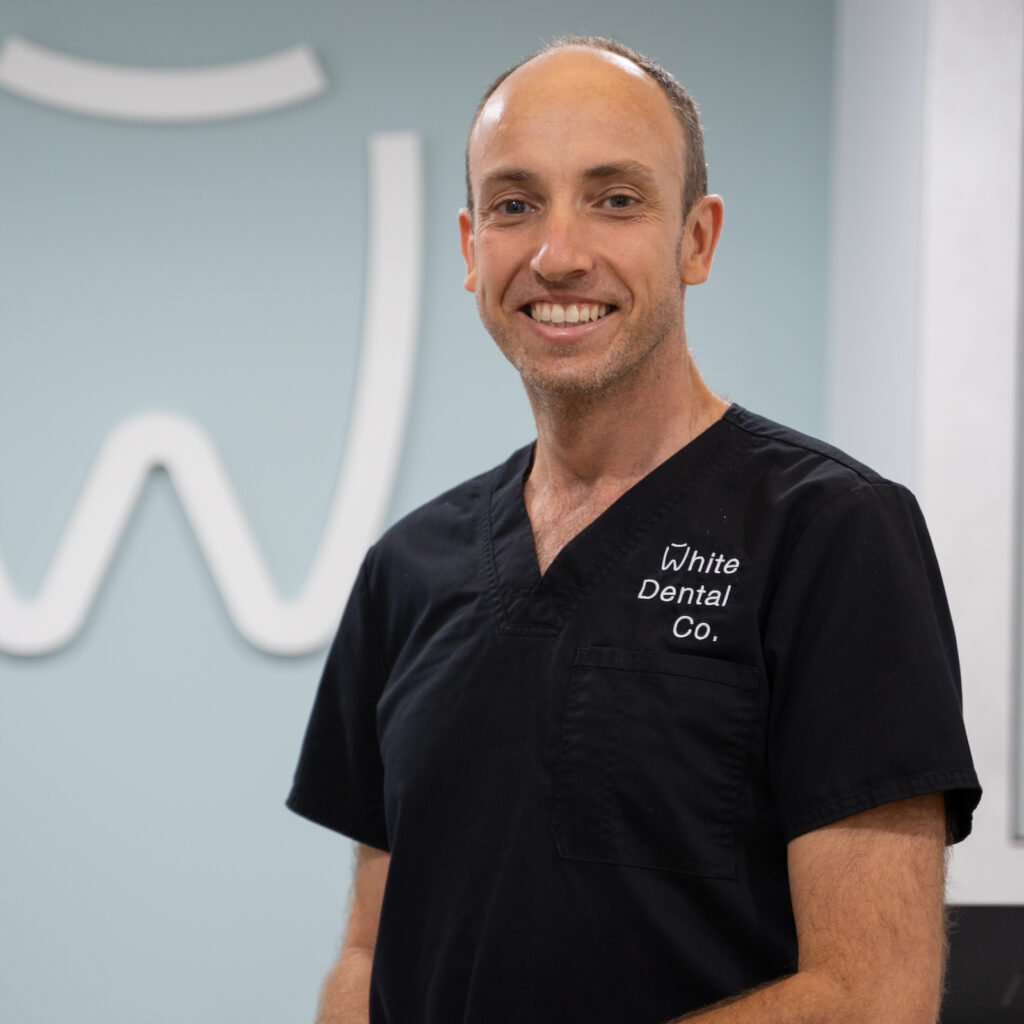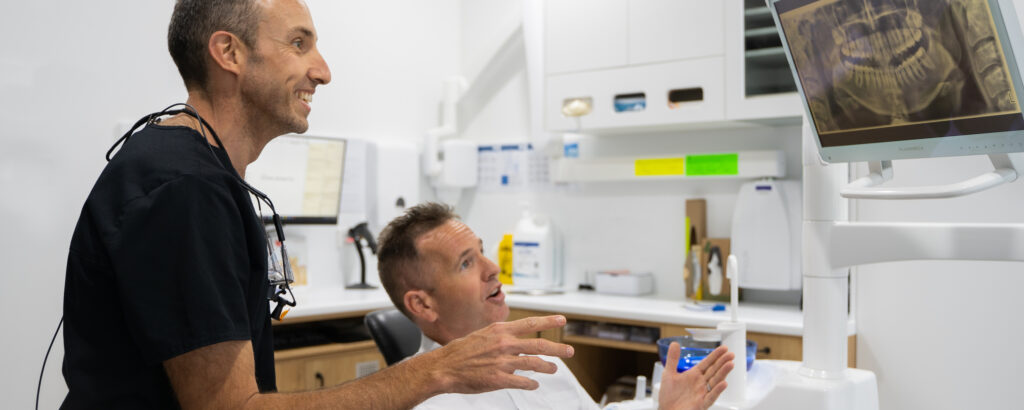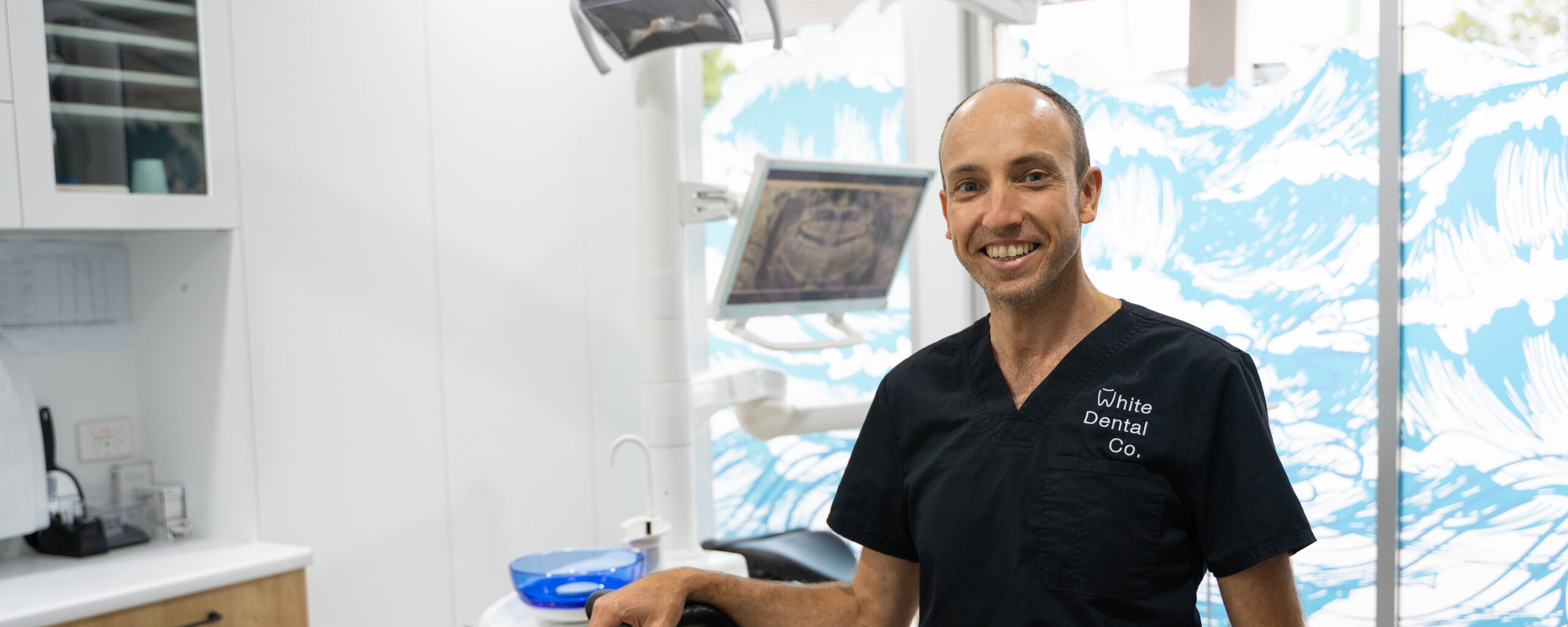
In this article, Dr Nick delves into
The importance of regular dental visits
At White Dental Co., we take a preventive approach to dental health and encourage our patients to do the same. In our practice, a regular check-up is an essential part of this approach.
As the principal dentist at White Dental Co., I do the majority of the check-ups in our practice. Our Oral Health Therapist, Amelia Cochrane, does the check-ups for many of our young patients.
At a check-up appointment, we
- evaluate the overall health of a patient’s teeth, gums, and mouth
- detect any potential concerns early and prevent them from worsening
- suggest suitable preventive measures
- advise how to maintain good oral hygiene
- recommend treatments such as cleaning, fillings, or extractions if they are necessary.
Regular visits to the dentist ensure that any dental issues are addressed promptly. Our goal is to help our patients enjoy healthy and beautiful smiles for years to come.
Recommended dental check-up frequency
The recommended frequency of dental check-ups may differ based on individual requirements. We no longer follow the “Visit your dentist every six months” guideline because, for many people, it’s not an appropriate frequency.
Instead, we take a research-based approach when it comes to recommended dental appointment intervals.
For example, many of our patients follow a tooth-friendly diet, floss, and brush their teeth daily. With such dedication to keeping their teeth healthy, these patients don’t need to see us as often.
A person who
- isn’t as disciplined with their diet or oral hygiene
- has a history of dental issues
- has specific medical conditions
will likely need more frequent check-ups for optimal oral health.
Some of our patients are at a high risk for developing dental diseases, so we see them as often as every three months. Patients with low risk may visit us every 12-24 months.
In short, each person’s oral health status is unique to them, and our recommendation for check-up frequencies reflects this.
What you can do to extend the time between your check-up appointments
Your actions can reduce the frequency of your recommended dental check-ups.
Ideally, you’ll become very disciplined with your daily tooth cleaning. If you brush your teeth twice daily and floss them every evening before you sleep, your dental health will likely improve.
If you choose mainly tooth-friendly foods and drinks and avoid harmful habits like smoking, your teeth and gums will be even healthier.
I love it when my patients commit to looking after their oral health. It’s a great feeling to move a person who previously came in every six months onto a 12-month check-up frequency.
Factors influencing check-up frequency
When determining how often to get a dental check-up, several factors come into play. These factors include the person’s
- age
- overall health status
- family medical history
- lifestyle habits
- pre-existing medical conditions or health concerns
- access to healthcare services
- healthcare provider recommendations,
- level of commitment to taking care of their oral health and
- personal preferences or beliefs about healthcare.
To make the best decision, I think it’s a good idea to chat with your dentist and with your medical GP. Your oral health and your general health influence each other, and neither should be considered in isolation.
Benefits of regular dental visits
I’ve already alluded to some of the benefits of prioritizing regular dental check-ups. There are a few key benefits to scheduling routine appointments with your dentist.
Check-ups can detect and prevent dental problems before they become more serious issues.
This can save you from experiencing more painful and expensive dental procedures in the future.
Dental check-ups are usually combined with professional cleaning of your teeth.
A professional cleaning removes the tartar buildup that brushing and flossing can’t remove. Your dentist can also polish your teeth to remove stains that may have accumulated from drinking coffee, tea, and other tooth-staining foods and drinks.
Your dentist can provide personalised advice on how to improve your oral hygiene routine and overall dental health.
They can also recommend suitable dental products and treatments that can help address any dental concerns you may have.
You remain connected with your dental team.
At White Dental Co., we really enjoy catching up with our patients for their check-ups. It’s great to find out how they’re feeling, what they’ve achieved since we last saw them, and their upcoming plans.
This connection is especially important for children and seniors.

Children enjoy better dental health when they have a positive association with dentistry. This fact is the reason we make it a priority to establish a good relationship with children from an early age. This isn’t hard for the White Dental Co. team because we genuinely enjoy welcoming children and their families into our practice.
Seniors also benefit from having a long-term, trusted dental team that they visit regularly. This is especially true if they experience debilitating health issues like dementia. The Australian Dental Association recommends, “Where possible, people with dementia should continue to see their regular dentist for dental care as they are familiar with the dental practice and dentist.”
We value our connection with local families and businesses in our vibrant community of Hervey Bay.
What to expect during a dental check-up

During a check-up at White Dental Co., I begin by welcoming the patient and having a chat with them. I like to find out how they’re going. A person’s sense of well-being has a big impact on their health.
For example, if people have had a tough few months, their dental health may have declined. If they’ve got an exciting event coming up – graduation, wedding, or overseas trip – they’re likely to be very motivated to get their teeth in top condition.
I’ll ask the patient whether they have any concerns about their teeth or mouth. If there have been niggles or noticeable changes, I’ll ask questions to help me diagnose the problem.
Then, I review the patient’s medical and health history. If the patient has an illness or health condition or if their medication has changed, this can directly affect their oral health.
Next, I examine their teeth, gums, and mouth to detect any signs of oral health problems such as cavities, gum disease, or oral cancer. I sometimes recommend that x-rays be taken to detect any issues that cannot be seen with the naked eye.
During the appointment, my dental assistant makes a record of the person’s current dental health. This record includes
- the presence and location of decay, enamel chips or cracks, and suspicious areas that need investigation
- whether the gums bleed on probing (a sign of gingivitis)
- the depth of gum pockets
- the results of any investigations and my diagnosis.
If any oral health problems are detected, I’ll discuss them with the patient. I’ll explain
- why the conditions have developed
- treatment options
- treatment timelines and
- estimated treatment costs.
If the issue could affect other teeth, I’ll explain how we can prevent it. I’ll answer questions and provide written information my patient can review at home.

Sometimes, I’ll even draw a diagram or two. I’m not much of an artist, but a hand-drawn image can sometimes help a patient’s understanding better than words.

If there is a buildup of plaque or tartar or the patient’s teeth are stained, I’ll professionally clean their teeth. This makes it easier for the person to clean their teeth after the appointment.
Once the teeth are freshly cleaned, I may recommend and teach brushing and flossing techniques. This is essential if the patient is having trouble maintaining good oral hygiene at home.
At the end of the appointment, I’ll recommend a timeframe for the patient’s next check-up. Our reception team will assist the patient in scheduling treatment appointments if needed.
Is it time to schedule your next dental check-up?
As I’ve outlined in this article, regular dental check-ups are essential for
- maintaining good oral health
- preventing dental problems from developing or worsening
- receiving professional cleaning if needed
- getting personalised advice about your oral health and
- receiving treatment recommendations.
Regular dental check-ups with a dentist you like and trust can ensure that your teeth and gums stay healthy, strong, and beautiful for years to come.
If you don’t have a regular dentist, I invite you to make a check-up appointment at White Dental Co. At the end of your check-up, I’ll give you a customised-for-you answer to the question of how often you should get dental check-ups to enjoy optimal oral health.
Resources
Evans, R., Pakdaman, A., Dennison, P. and Howe, E. (2008), The Caries Management System: an evidence-based preventive strategy for dental practitioners. Application for adults. Australian Dental Journal, 53: 83-92. https://doi.org/10.1111/j.1834-7819.2007.00004.x
Dementia and its effect on oral health – Australian Dental Association. (n.d.). Teeth.org.au. https://www.teeth.org.au/dementia



